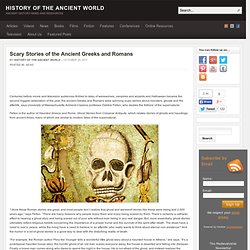

Railways in the Greek and Roman world. The Madness of the Emperor Caligula. The Madness of the Emperor Caligula By A.

T. Sandison Medical History, Vol.2:3 (1958) Introduction: Throughout the centuries the name of Caligula has been synonymous with madness and infamy, sadism and perversion. Our knowledge of the life of Caligula depends largely on Suetonius, whose work De vita Caesarum was not published, until some eighty years after the death of Caligula in A.D. 41. Nevertheless, the outlines of Caligula’s life-history are not in doubt, and a useful summary is given by Balsdon in the Oxford Classical Dictionary. Click here to read this article from Medical History. Minoan Aqueducts: A Pioneering Technology.
Dougal Dixon - Man After Man : An Anthropology of the Future (1990) Flickr set here "The book begins with the impact of genetic engineering.

For 200 years modern humans morphed the genetics of other humans to create genetically-altered creatures. The aquamorphs and aquatics are marine humans with gills instead of lungs. One species - the vacuumorph - has been engineered for life in the vacuum of space. Its skin and eyes carry shields of skin to keep its body stable even without pressure. Since then the genetically-altered humans must face a new phenomenon. After five million years of uninterrupted evolution, the descendants of modern man that retreated into space returned. Eventually the spacefaring humans left, the Earth was left in ruins. The book can be read online here. Learn more about the artist, Dougal Dixon, at his website.
And this is where I'd normally link to a purchase link for the book but it's been out of print for twenty years and used copies are not cheap. History: Free Courses. Advertisement Get free History courses online from the world's leading universities.

You can download these audio & video courses straight to your computer or mp3 player. For more online courses, visit our complete collection, 1,250 Free Online Courses from Top Universities. How Many U.S. Marines Could Bring Down the Roman Empire? It all started as a thought experiment on Reddit.com when a user posed the question: “Could I destroy the entire Roman Empire during the reign of Augustus if I traveled back in time with a modern U.S.

Marine infantry battalion or MEU?” Then the Reddit user offered a more precise scenario: Let’s say we go back in time with a Marine Expeditionary Unit (MEU) … could we destroy all 30 of Augustus’ legions? We’d be up against nearly 330,000 men since each legion was comprised of 11,000 men. These men are typically equipped with limb and torso armor made of metal, and for weaponry they carry swords, spears, bows and other stabbing implements. The question touched off a frenzy of discussion. Obviously, there is a massive difference in firepower. But here comes the difficulty: In the short term and in the open, modern infantry could massacre any ancient soldiers at little risk to themselves. Via Andrew Sullivan. The Disappearance of Ancient Slavery.
– November 13, 2011Posted in: Articles The Disappearance of Ancient Slavery McKay, Cory McGill University (2003) Abstract. Welcome to OLD-COMPUTERS.COM ! 30+ Retro Print Computer Ads from the 90′s – Vintage Geek Design Nostalgia. Remember when a an 8 GIG Hard Drive was standard on a $3,000 computer?

I do. Those were the days. I was thinking about my first computer the other day – It was a 150 MHZ Intel Pentium with an 8 GB hard drive and 64 MB’s of Ram & a 14.4k dial up modem I believe. Twas a beast. It was 1995 and the internet and computers were new to us all for the most part. Need MOAR OBSOLETE COMPUTER ADS!? The 25 Funniest Vintage Tech Ads Do you remember any of these?
You like this? If you like this, You'll love These. Scary Stories of the Ancient Greeks and Romans. Centuries before movie and television audiences thrilled to tales of werewolves, vampires and wizards and Halloween became the second biggest celebration of the year, the ancient Greeks and Romans were spinning scary stories about monsters, ghosts and the afterlife, says University of Massachusetts Amherst Classics professor Debbie Felton, who studies the folklore of the supernatural.

Felton is the author of Haunted Greece and Rome: Ghost Stories from Classical Antiquity, which relates stories of ghosts and hauntings from ancient times, many of which are similar to modern tales of the supernatural. “I think these Roman stories are great, and most people don’t realize that ghost and werewolf stories like these were being told 2,000 years ago,” says Felton. “There are many reasons why people enjoy them and enjoy being scared by them. There’s certainly a cathartic effect to hearing a ghost story and being scared out of your wits without ever being in any real danger. The History of Rome.
Die Geschichte der Söldner.